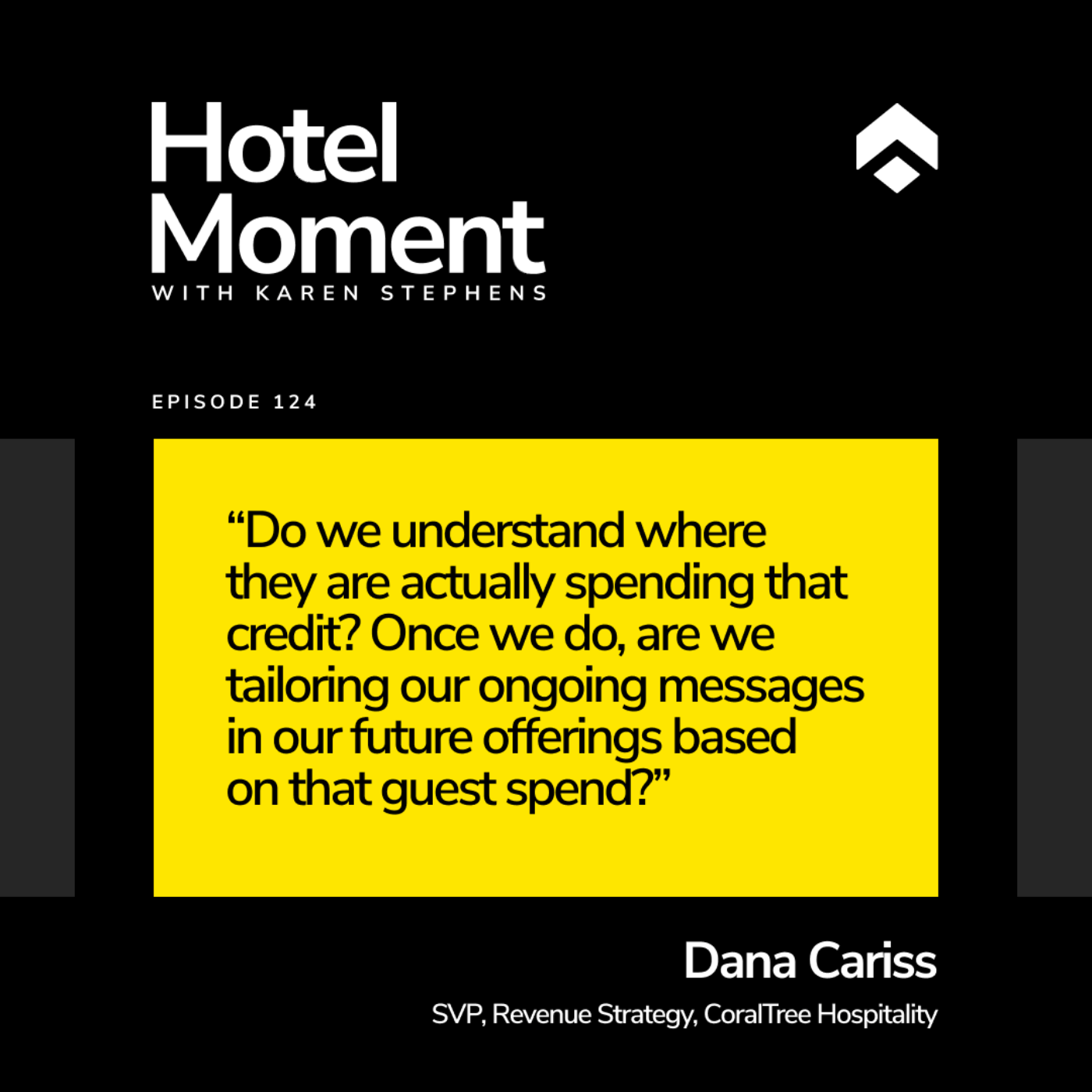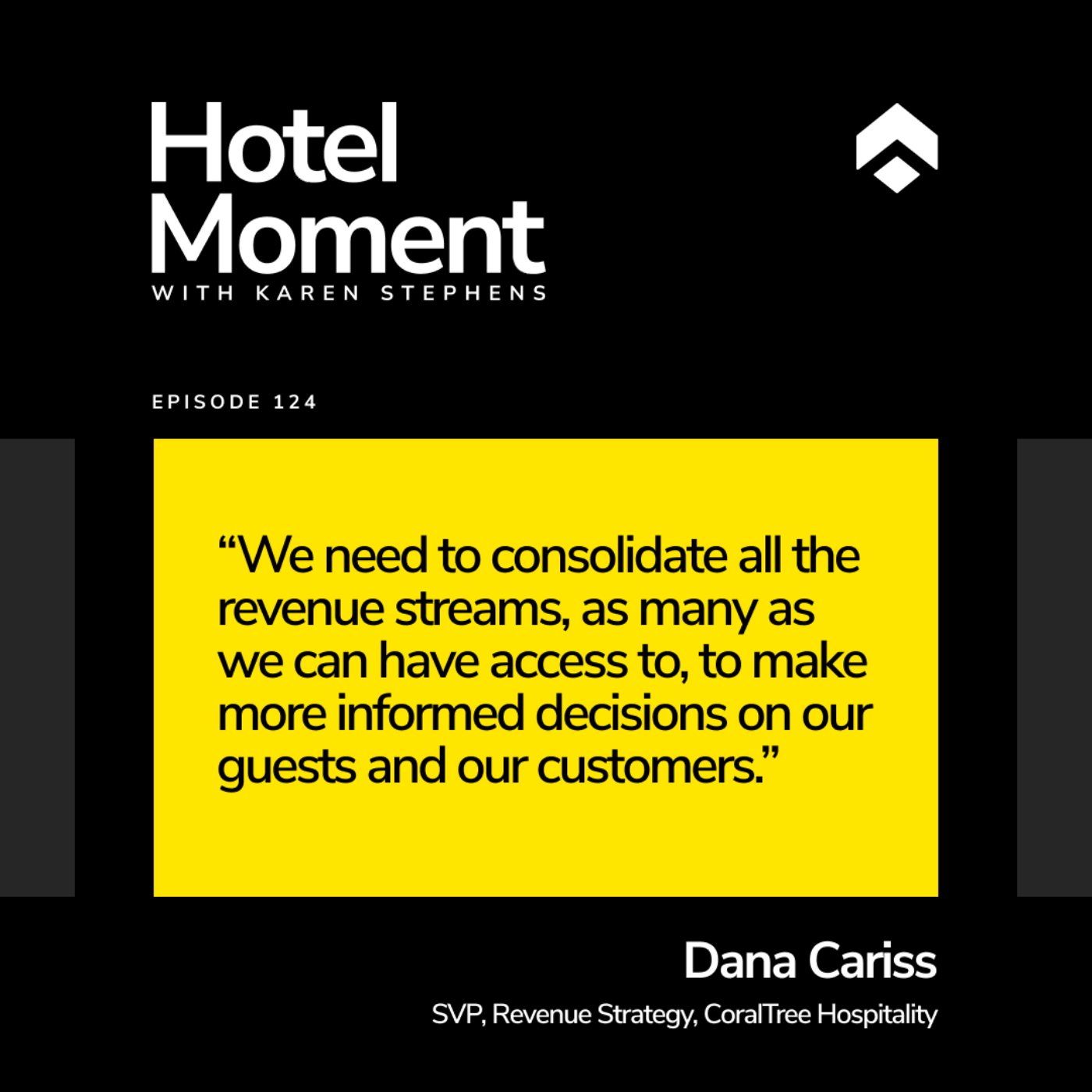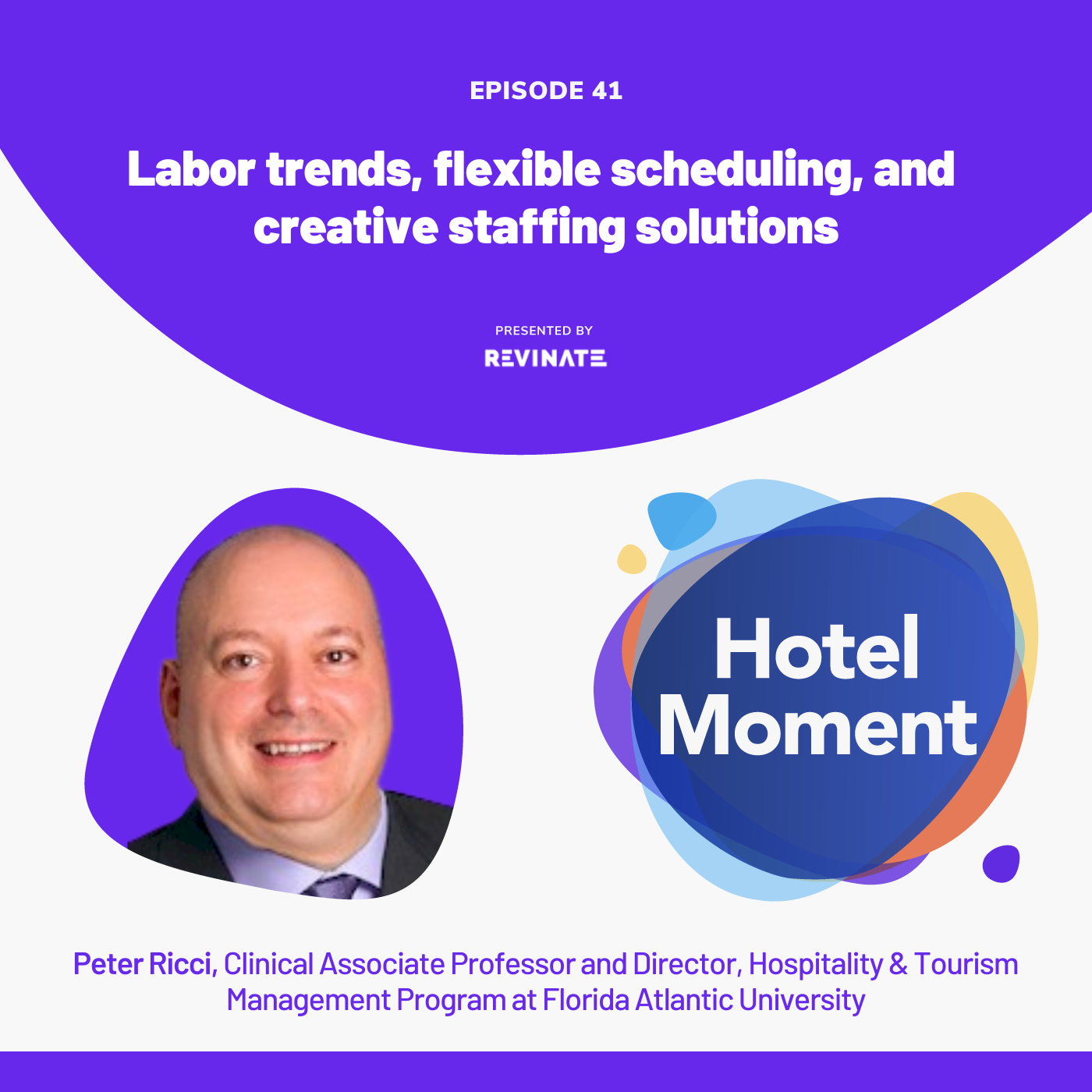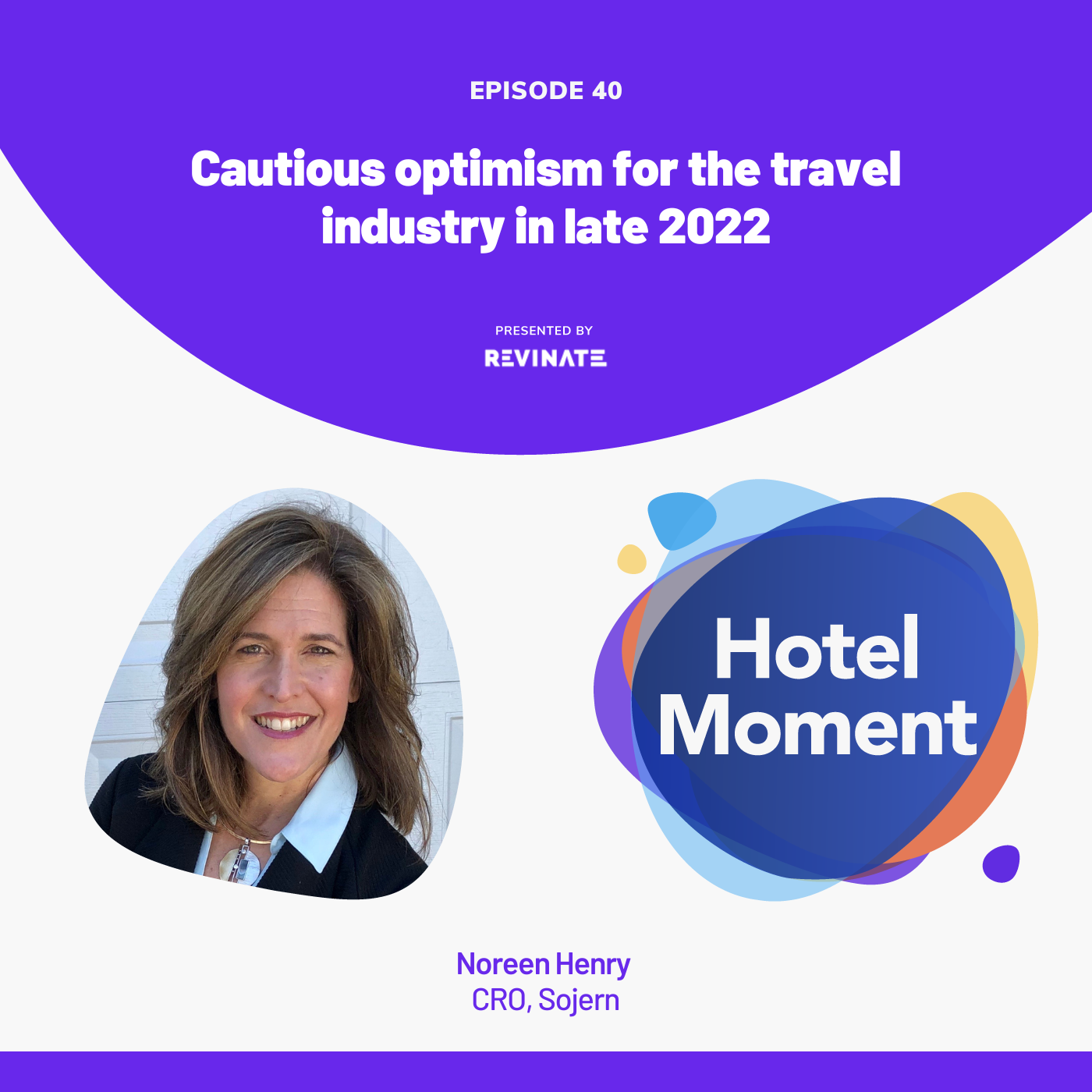Hotel Moment
WITH KAREN STEPHENS


Episode 124
Transforming the hotel guest experience with personalization and predictive analytics
In this week’s episode of Hotel Moment, Dana Cariss, Senior Vice President of Revenue Strategy at Coraltree Hospitality, joins Revinate CMO Karen Stephens with lessons on revenue strategy, the hotel guest experience, and understanding the true value of guest spend.
Dana explains hoteliers often miss out on additional revenue opportunities if they fail to track where each guest is spending on property. But with tailored guest messaging and thoughtful segmentation, Dana says hoteliers can truly maximize their guest’s share of wallet while delivering personalized experiences worth returning for.
Since data is at the heart of any revenue strategy, Dana also highlights the growing need for hoteliers to stay on top of their tech systems and choose technology that promotes a holistic and comprehensive view of guest data — making analysis easy and data actionable.
Tune in and discover the gaps in your revenue strategy to take a proactive approach to the hotel guest experience and tracking guest spend across your portfolio.
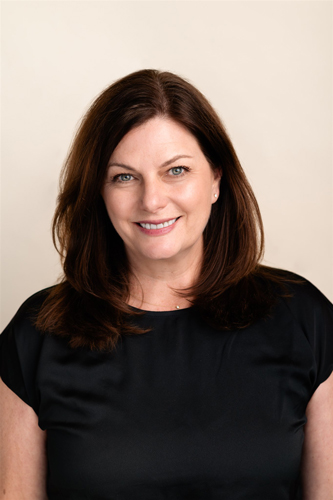
Meet your host
As Chief Marketing Officer at Revinate, Karen Stephens is focused on driving long-term growth by building Revinate’s brand equity, product marketing, and customer acquisition strategies. Her deep connections with hospitality industry leaders play a key role in crafting strategic partnerships.
Karen is also the host of The Hotel Moment Podcast, where she interviews top players in the hospitality industry. Karen has been with Revinate for over 11 years, leading Revinate’s global GTM teams. Her most recent transition was from Chief Revenue Officer, where she led the team in their highest booking quarter to date in Q4 2023.
Karen has more than 25 years of expertise in global hospitality technology and online distribution — including managing global accounts in travel and hospitality organizations such as Travelocity and lastminute.com
Watch the video
Transcript
Dana Cariss – 00:00:00: The first thing that comes to mind, we often as an industry will offer a resort credit. This, comes stay two nights and we’ll give you 200 bucks of resort credit, which is great. So we can see very quickly if the guest is using it or not, right? Breakage or not. What I would, I guess, ask the listeners in the broader collection of revenue leaders is, do we understand where they are actually spending that credit? And then once we do, are we then tailoring our ongoing messages in our future offerings based on that guest spend?
Karen Stephens – 00:00:37: Welcome to the Hotel Moment podcast presented by Revinate, the podcast where we discuss how hotel technology shapes every moment of the hotelier’s experience. Tune in as we explore the cutting edge technology transforming the hospitality industry and hear from experts and visionaries shaping the future of guest experiences. Whether you’re a hotelier or a tech enthusiast, you’re in the right place. Let’s dive in and discover how we can elevate the art of hospitality together.
Karen Stephens – 00:01:07: Hello and welcome to the Hotel Moment Podcast. I’m your host, Karen Stephens, the Chief Marketing Officer of Revinate. And today on the podcast, we have Dana Cariss, who’s the Senior Vice President of Revenue Strategy at Coraltree Hospitality. With an extensive background in revenue strategy, data analytics, and personalized guest experiences, Dana has been at the forefront of using technology to optimize revenue while ensuring luxury properties deliver exceptional guest experiences. His expertise spans multiple top-tier brands and boutique luxury hotels, where he’s been instrumental in leveraging data to drive performance, elevate guest satisfaction, and implement long-term strategies. So Dana and I have been crossing paths for years. It’s interesting. He talks a little bit right at the beginning about his journey, which has been effectively with the same company that’s transitioned through a number of times. So he’ll talk about that. But the current company, Coraltree, started with just a handful of properties, now over 40 properties. So he goes into that and how diverse it is to kind of think about revenue strategy across. I think what I really keyed into on this conversation is how Coraltree thinks about their own data, the importance of integrating with other systems, and how you really use that data to segment, personalize, and ultimately drive both guest satisfaction and conversion. So I give you Dana Cariss.
Hi, Dana. Welcome to the podcast.
Dana Cariss – 00:02:27: Good morning. Thank you for having me.
Karen Stephens – 00:02:28: Well, I’m very excited to have you. The last time I got to see you, it was in person at Terranea Resort, which is one of your premier properties in the portfolio. So that was wonderful. And what a great time we had.
Dana Cariss – 00:02:40: It was a beautiful day. Yeah, Terranea is not a bad place to visit. And yeah, it was very honored for you to have me. So thank you for inviting me out.
Karen Stephens – 00:02:47: Absolutely. So we had Dana there for our listeners. We had a go-to-market kickoff, and he gave some great insights to our team about how to work with people in his position. So, Dana, for our audience here, your experience spans both large and well-established brands and boutique properties like Terranea. Can you share a bit about how your journey led you to Coraltree and how your company’s approach to revenue strategy and guest experience stood out?
Dana Cariss – 00:03:11: Led me to Coraltree. I guess we can start there. I’m one of the few people in the industry who hasn’t bounced around the country of the world as part of their career. I actually grew up in Southern California. I went to school in La Jolla at UCSD. And my first job with what was then Destination Hotels was at Estancia La Jolla. And it’s actually right across the street from where I went to college, coincidentally. And that was one of my first jobs ever as a director of revenue. And then interestingly enough, I never really left. Again, one of the few people I spent the next eight or nine years actually working kind of in and around the Southern California area across the West Coast. Eventually, I did leave for a short period right after Two Roads was created. And I left for a couple of years. I went and worked at Aimbridge with Evolution Hospitality out of San Clemente. And then I came back about a month after Coraltree kind of rebooted. So after the sale, of Two Roads to Hyatt, I came back and I’ve been here since. And I’ve been loving every minute, just a quick bit of data. Initially, we were a little bit of a holding company, really, after all of the management contracts were sold to Hyatt. We were kind of discovering or figuring out what it was we wanted to be. At that time, we finished 2019, right before the pandemic, and the world shut down. We had eight hotels. Today, I can’t keep track. We’re somewhere in the mid-40s. So it has been quite a growth over the last six plus years.
Karen Stephens – 00:04:41: Yeah, and how does the portfolio look now? Is it a mix of branded hotels and independents? So what do you have across those 40, and where are they located broadly?
Dana Cariss – 00:04:48: Yeah, we have about a dozen brands, maybe eight hotels, eight Marriott. We have a couple Hiltons and a couple Hyatts. The vast majority of the rest are all independent. So within the independent collection, we have some large resorts. We have some small boutique lifestyle hotels located in city centers. And then we also have a growing, I think we’re about 1,200 keys now, maybe even a little bit more than that on the vacation rental side. So something that is long-rooted in the history of our company, we actually were founded as a property management company initially. So we kind of always been in this vacation rental space, short-term rental space. And we’re proud and glad to be back in there today. Like I said, it’s about 1,000 keys, and we’re somewhere between 8,000 and 9,000. So it’s a decent percentage of our part total inventory.
Karen Stephens – 00:05:38: Wow. So this is going to be a really broad question, but I’m curious, just knowing kind of the mix that you’re talking about. You’ve got enterprise brands, you’ve got independents, you’ve got vacation rental. So as the SVP of Revenue Strategy across all of that, like what does your day look like when you get up with all of those things in play? Because I imagine is the strategy a little different depending on what the asset that you’re working with or how do you think about it?
Dana Cariss – 00:06:00: Nimble, flexible. My wife is a first grade teacher. She loves to say flexible thinking. Karen, honestly, we have some really great people that work in our organization, and we empower them to make decisions on a daily basis. It does require a lot of nimbleness. You have one strategy call with a large resort located in California, maybe where they have a very specific set of demand drivers. The next call you’re on is a small boutique hotel in downtown Chicago. And, you know, then later that day, you’re talking about vacation rental business in the mountains of Colorado. So it certainly makes for a very interesting day. There’s never any shortage, as I’m sure everyone who I would imagine you’re talking to or sits in a similar chair as I do. There’s never a shortage of things to do and things to be thinking about.
Karen Stephens – 00:06:47: Well, it keeps it interesting, keeps it moving, right?
Dana Cariss – 00:06:49: That it does.
Karen Stephens – 00:06:51: So if we shift a little bit, so in your role, if we focus on the luxury sector, how do you blend operational efficiency with that service? And how do you define success in that balance, especially with high-end hospitality?
Dana Cariss – 00:07:04: That’s a great question. First and foremost, in the luxury segment, before we start talking about technology and how we communicate, when we communicate, and things like that, I think first and foremost, the focus needs to be on service and service delivery. I know that’s not exactly in my realm of focus kind of at its core. However, a good example, I was just at a property we just opened in Fort Lauderdale, Pier 66, the reimagined luxury hotel in the south end of Fort Lauderdale. And I’ve been there a couple of times now post-opening, and it’s not lost on me every time I walk in there. And the first thing you’re greeted with is attention, really. It’s eyes, it’s body language, not to mention, it’s a name. We’ve got earpieces in that are communicating who just arrived. And then as you walk down the arrival experience, the front desk, all the way to that, make you a fit elevators, you know, kind of every touch point, someone is mentioning your name and welcoming you. I think first and foremost, that’s what we need to get right. That’s what brings them back. But from a technology standpoint, and kind of how from a life cycle conversation, how are we going to continue to communicate with guests? I think that becomes a whole nother conversation. Personalization is something that’s talked about a lot, kind of thrown around as if this, you know, is the magic bullet. But I think tactically, what does that mean to, you know, how to execute? I think in a lot of ways, it’s anticipating some guests’ needs. So I’ll give you a couple examples. When arriving in a place like Terranea, they are regularly communicating with you both your expectation of arrival time and departure. So they can curate your arrival and departure experience for you. So if you’re going to arrive early, they’ve got a team of people there that are going to take your bags and your car and kind of whisk it away and then move you off somewhere if your room isn’t ready. Similarly, with a later arrival, they’ll have your room prepped and turned down already ready. They might even have a small bite or kind of predictive needs that evening, right? I think it’s these touchpoints along the way that I think resonate with people. And then we haven’t even talked about the technology side of CRM and what that means to communicate with the guests. And I think there are small little touch points along that cycle and that narrative that can also add to those kind of that predictive analysis and the service delivery as well.
Karen Stephens – 00:09:31: Yeah, let’s talk about that. Predictive analytics. So obviously the output for the guest is you’ve anticipated my needs, and I’m getting a bite in the room with the rest of, you know, something is happening during my journey that feels very seamless for the guest. But can you talk a little bit about what’s going on behind the scenes? So how have you used predictive analytics to really, and that behavioral data to kind of package up and curate offers for your guests even before they arrive?
Dana Cariss – 00:09:59: That is this concept of big data. I feel like it’s something that’s been hanging around the hoop for a better part of a decade. I think only just now are we really maybe wrapping our heads around it, both us as a company at Coraltree, but also as an industry. For us, just real quick trip down kind of memory lane, just to maybe bring the listeners and yourself up to speed. We’ve been on a journey for about the last four years in consolidating all of our revenue in a single data warehouse. So we have partnered with a third-party company, and we’re pulling our PMS data. We’re pulling our sales and catering data. We’re putting our point of sale data. Now we actually have our financial data, which kind of sits off alone. But the other three are kind of core. And what we’re doing is we’re pulling it into a single data warehouse. We’re then using Power BI to visualize. And this is at the transaction level. So what this gives us is the ability to understand our customer better, and the customer spend. Most importantly, I think maybe a good example would be with packages. The first thing that comes to mind, we often as an industry will offer a resort credit. Come stay two nights and we’ll give you 200 bucks of resort credit. Which is great. So we can see very quickly if the guest is using it or not, right? A breakage or not. What I would, I guess, ask the listeners in the broader collection of revenue leaders is, do we understand where they are actually spending that credit? And then once we do, are we then tailoring our ongoing messages in our future offerings based on that guest spend? That to me is the silver bullet. I want to really understand at a transaction level, what our guests are spending, then we can truly tailor, personalize, if anything, just personalize communication simply with an email or text message, whatever. But you can certainly get down into the mitty gritty very quickly once we understand how each of our profiles are spending their money.
Karen Stephens – 00:11:57: Right. That’s very interesting. Well, the new thing that we’re talking about now is ancillary revenue. Obviously, it’s been there forever, but I think your point is really well made. If you understand that I always go to the spa, and you’re a golfer, because I know you’re a golfer. So if I understand you correctly, if you’re giving me a resort credit one time around, you pick up that I’m spending in the spa, then the next time you send me an offer, it’s tailored to include a spa package or some kind of upgrade just for that, which is obviously going to drive conversion. So have you seen that conversion uplift already, or is it early days for you, or how are you using that data now?
Dana Cariss – 00:12:29: Yeah, I think we’re doing our best to make decisions and to put processes in place. I don’t think this is something, and I certainly don’t mean to imply that this is something that you can do for every guest. I think that would be quite the ask. But I think what the desired outcome here is that we can set up drip campaigns, we can set up rules. And within the CRM, you can create these kind of buckets of consumers that fit personas that you’re focused on. And then you can kind of take your segmentation a few levels deeper, based on where they’re spending their money, and maybe even how much money they’re spending, and can really get that segmentation level deeper. I once heard from a partner who may or may not have a email domain from a group that we’re working very closely with. But he said that, I believe it was the seventh level of segmentation. So not just one level. So you take this down four, five, six, seven levels of priorities is when we find the best conversion on an email. So the more targeted, the more deep, the more you can understand, the more success we’re going to have.
Karen Stephens – 00:13:41: Absolutely. I mean, we see that in our own data for Revinate. Absolutely. The more filters you apply, the smaller the send groups are. You know, when you think about 10 years ago, when it was just one email that went out to everybody, your entire database, and you just pray for, you know, 1% to click on that thing. And now the more segmentation you get, the better, which is really interesting.
Dana Cariss – 00:14:01: Yeah, it’s rifle versus shotgun, right?
Karen Stephens – 00:14:03: Exactly. And it’s tremendous to see. And it makes sense, especially I think now, if you think about the evolution, how many messages that we have coming at us all the time now we’re also starting to see the omnichannel effect. So if someone doesn’t open an email, where they click on a text message, where they pick up the phone, so that shows even higher conversion across if you can tie all of those channels together. So Dana, how do you see the role of technology evolving in the luxury hotel sector over the next few years, particularly with respect to revenue optimization and guest experience?
Dana Cariss – 00:14:34: I think we’re on the path we’re going to be on for a little while. I think we’re going to continue to see some evolution in guest journey and in our ability to kind of further delineate specific guest personas for us. That’s where I think the vast majority is. I know that Revinate, as an example, is continuing to roll out and develop their CDP. I think that’s a big, big part of the guest journey process. Being able to, to your point a few minutes ago, segment the data and better understand where these customers are and what their tendencies are. I think that to me is a big development coming in the CRM space. And I would hope, and I will put this out into the ether, that we continue to see improved integrations across the industry. Man, that is a whole nother topic that maybe is another podcast conversation I’m sure you’ve had with previous, previous folks. But man, it is a somewhat broken space. And it would be great if we could figure out a way to continue to align and more easily find synergies and integrations with more groups. Right now, I think that’s probably the biggest challenge with people and their data is everything is segmented. And it’s just hard to pull it all in. So back to a point from mine a few minutes ago, it’s been this years long journey now to really, truly consolidate everything. And I can say very confidently that we’ve accomplished that. Now, we’re kind of in this front end of like, now, what do we do? How do we now build out a strategy in the coming years to more, better define what our guest journey and what our strategy is related to personalization and communication with our guests?
Karen Stephens – 00:16:21: Right. And I definitely want to pick up on what you said about the importance of integrations. And I think in the past, maybe vendors may want to own a huge piece of this and that. But for us, the customer owns the data. That’s the core. And so you have to be able to play well in the sandbox if you want to be part of that ecosystem. And some of that is just having the right tech setup to be able to play in the sandbox. You have to have APIs that integrate well, and you have to be able to do that. But I think on the positive side, what I’m hearing more and more is people are starting to understand that. Tech companies are starting to understand that. I had Georgine Muntz, who’s the CEO of Visual Matrix, it’s PMS, who was on the other day. And she actually has advisory boards where they have partners come together so that they can leverage the integrations and make sure that that moves forward for the customer. So that resonates.
Dana Cariss – 00:17:08: Yeah, it’s a very kind of apropos conversation. I think today, I’m sure everybody in their respective companies are having the same conversation. My hope, be, maybe before I say my hope, one of the things that I’ve noticed is we’ve had this kind of consolidation happening. There’s not as many small players in regardless of discipline and or platform technology. Over the years now, we’ve had this slow movement to larger, bigger companies that are focused on more things. And that might be the way of the future. But I don’t know as a hotelier on my end, if that’s always or that is the right thing, to be honest, I feel like as it relates to a hotel management company, we want to stay very focused on the thing that we believe we do really well. And if we get too off of that focus and moving in different directions, we kind of lose the vision of the thing that we, and maybe even lose the sharpness on the thing that we do best. And I’m a little worried that as the consolidation continues and companies are getting bigger, and they’re doing more, right? We do everything under one house. I feel like, are we really then an expert at any one of those things that exist under the umbrella? So my hope would be that if we continue down the path of this kind of less companies doing more, that we can find some ways to really find experts in any one space.
Karen Stephens – 00:18:32: That makes sense. I mean, on one hand, it’s like, okay, now we only have one throat to choke. But on the other hand, you have best in breed across all of the things that you’re trying to do within that company. I understand that.
Dana Cariss – 00:18:43: It would be quite the accomplishment if a company can do it. But the reality is they probably do one or two of those things really well. And they do the other ones, they likely were an acquired group. So they probably do them okay.
Karen Stephens – 00:18:55: Absolutely. And I think you’re set up as you talked about having your own centralized data warehouse. So you’ve already got kind of the core of that. And now you’re looking for partners to be able to take that data in and out and do the things with it. So I think that gives you a foundational advantage in my view, because I feel like a lot of companies out there still, they just have kind of a conglomeration of legacy and new platforms. And somebody wants to do something cool. So they try to tack that on somewhere. And then the champion leaves. And so nobody knows what to do with it. I think we’d see that a lot. So that brings me to my last question. So if you were to advise hotel operators and revenue managers and strategists, where do you start if you’re looking to kind of, and maybe this is a huge question, but if you are one of those people I just described out there where you’re looking at your group and you’re like, oh my gosh, we kind of have a conglomeration here. Where would you advise that they start to make progress on their side with the data?
Dana Cariss – 00:19:49: I don’t love the analogy of how do you eat an elephant, but I can’t think of anything maybe more appropriate at this moment. It is a huge undertaking to begin to truly consolidate all of your data into a single spot. We’re seeing it in the brands. Finally, Marriott, Hilton, Hyatt, they’re all creating these giant data lakes, I think is the word that they’re using for them, putting all of your information in a single place, and then allowing people to go and pick out the pieces that they want. For me, that’s where you start. I believe that we all need a dashboard of more than just any one thing. We need to consolidate all the revenue streams, as many as we can have access to, to make more informed decisions on our guests and our customers. One small example is a direct bookings versus an indirect booking. And I am guilty, like all the time, saying I want more direct bookings. So I’m looking at one thing often, which is the cost of acquisition. The cost of acquisition for a direct bookings is a fraction, single digits, really, as compared to any kind of average of our indirect bookings. That said, what we have found as a result of the analysis that we’ve run is that in some cases, in more cases than I would have ever expected, the spend, the total guest spend coming from many of our indirect customers booking through third-party and intermediaries, spend as much or more while on property than our direct bookings. So making sure we’re not too blinded by any one focus. And I think the important thing to pull through here is this dashboard concept. It’s how many of these different revenue streams can we feed in that give me a more full view, a more rounded view of my total guest spend, really focused on kind of upper upscale and luxury, right, where you have multiple revenue streams. And I think it’s still relevant for kind of mid-scale and down. There’s still some things that I think people can focus on. But I think the upper upscale, this is a really big thing. And then finally, kind of maybe full bow on it for me is this concept of curiosity. I think you can’t head out on this journey, you can’t begin to truly understand guest spend and this full cycle focus of your consumer, without some sense of curiosity to better understand it. I think we all tend to find ourselves in comfort zones, especially as everything is coming at you. We are creatures of habit. And I think those people that live with this sense of curiosity and constantly wanting to know what’s different, what’s around the next corner, how can I do things differently? What can I do different today than I did yesterday? I think that’s something that is a driving force behind change. And it’s something that’s important in order to, I think, accomplish what we’ve been talking about.
Karen Stephens – 00:22:46: I love that. Yeah. I mean, things are moving so quickly now, and I think they’re going faster than they ever have before. And I also don’t think that, that pace of change is going to slow. So I love that idea of curiosity and making sure you kind of look around and educate yourself of what’s out there because it’s changing very quickly.
Dana Cariss – 00:23:03: It certainly is.
Karen Stephens – 00:23:05: Well, Dana, I appreciate your time. Thank you for being my guest.
Dana Cariss – 00:23:08: Thank you for having me. It was my pleasure.
Outro – 00:23:14: Thank you for joining us on this episode of Hotel Moment by Revinate. Our community of hoteliers is growing every week, and each guest we speak to is tackling industry challenges with the innovation and flexibility that our industry demands. If you enjoyed today’s episode, don’t forget to subscribe, rate, and leave a review. And if you’re listening on YouTube, please like the video and subscribe for more content. For more information, head to revinate.com/hotelmomentpodcast. Until next time, keep innovating.
Episodes
Hotel Moment
WITH KAREN STEPHENS


Be the first to know when a new episode drops
This site is protected by reCAPTCHA and the Google Privacy Policy and Terms of Service apply. View our Terms & Conditions here. *Required fields.

